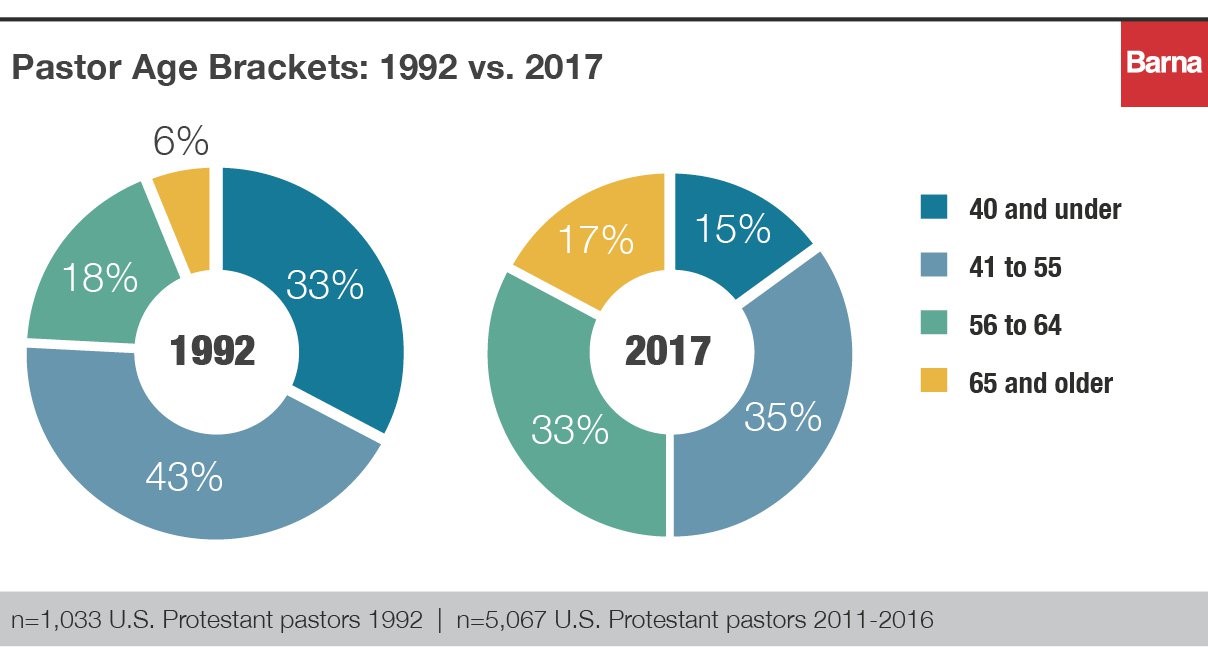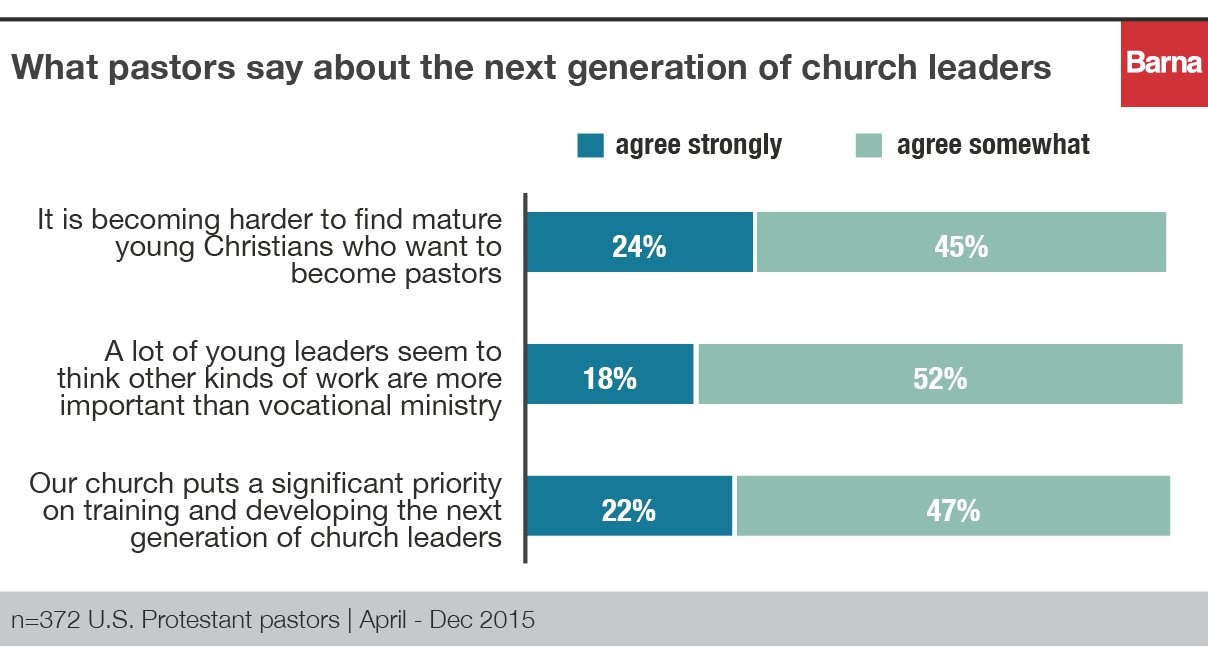Barna – a Christian research group – collaborated with Pepperdine University in California to study the impact of aging pastors on the future of the church. The study entitled The State of Pastor examined the shifting demographic of church leaders, and the cultural forces responsible for the dramatic changes.
When Barna first published a similar study back in 1992, the median age of evangelical pastors was 44 years old. One in three pastors was under the age of 40, and one in four was over 55. Just 6 percent were 65 or older.
These statistics have changed dramatically. Twenty-five years later, the average age of evangelical pastors is 54. Only one in seven pastors is under 40.
Half of evangelical pastors are 56 years and older. The percentage of church leaders who are 65 years and older has nearly tripled to 17 percent. This means that there are now more pastors in the oldest age bracket than there are leaders younger than 40.

According to Barna, this demographic change did not begin in the 1990s. The study pointed out that in 1968, 55 percent of all evangelical pastors were under the age of 45. That means that the majority of church leaders were in their 20s, 30s and early 40’s. Today, only 22 percent of pastors are under 45.
There are several reasons for this trend.
. First, people are living longer and working longer. The working trend in society is that people are retiring older because they are living older. The average life expectancy for men in 1970 was 64 years old. In 2015, it is 80 years old.
People are also working longer. In Singapore, the Retirement Age Act (RAA) has been replaced by the Retirement and Re-employment Act (RRA) in 2012. Under the RRA, the statutory minimum retirement age is still 62, but employers are now required to offer re-employment to eligible employees who turn 62, up to the age of 65.
. Second, the percentage of “second-career clergy” has been increasing over the past two decades. This refers to people who made a career switch to pastoral work in their mid-40’s.
. More pertinent to church ministry in Singapore, there is an increasing “negative view” of the pastoral ministry. Christian parents used to have a positive view of full-time ministry. It was not uncommon to have Christian parents dedicate and prepare their children to serve the LORD.
Now societal pressures, cost of living, and other factors, such as “success in life” have led Christian parents to direct their children career paths away from the pastoral ministry to other more “acceptable employment.”
Young people themselves are also increasingly attracted to vocations other than full-time church ministry, where the remuneration is higher and “success” is rewarded in materialistic terms. The truth is that it is difficult to rat race and the faith race at the same time.
. Fourth, a negative view of the church work in general. One factor may be the perception of poor remuneration of pastors. Another reason may be of the negative experiences in church work. In my interaction with young people, most have expressed a desire to serve, but many have also indicated that they prefer to serve outside the normal circle of church leadership because of real or perceived institutional baggage of the church.
These and other factors have resulted in a shortage of young potential candidates for the pastoral ministry. In the Barna study, a majority of current pastors say finding future pastors for the church is a real challenge. Two out of three current pastors (69%) believe identifying suitable candidates is becoming more difficult.
Thus, it is no surprise that presently-serving pastors find it difficult to identify and train their successors when we consider the declining percentage of practicing Christians in each successively younger generation.

All these factors and more are contributing to the “graying” of both full-time and lay leaders in evangelical churches. The older pastors and lay leaders are important and vital to the church. Their spiritual and pastoral experience are indispensable to guide the church in this age of uncertainty and complexity.
However, the church also desperately needs younger people to start preparing today for tomorrow.
Present leaders must take on the role of identifying, raising, and equipping godly, capable and resilient young men and women for church leadership. The reality is that not even the wisest of present leaders will be here indefinitely. And whatever experience or wisdom they have accumulated over the years will be lost to the next generation of the faithful unless it is invested in the next generation.
The burden, therefore, is for young people to step up and stand in the hedge. The LORD told Jeremiah, “Run ye to and fro through the streets of Jerusalem, and see now, and know, and seek in the broad places thereof, if ye can find a man, if there be any that executeth judgment, that seeketh the truth….” (Jer. 5:1).
The LORD also told Ezekiel, “I sought for a man among them, that should make up the hedge, and stand in the gap before me for the land, that I should not destroy it: but I found none” (Ezek. 22:30).
Let it not be said that there is none in our Church would up offer himself to make up the hedge, and stand in the gap for the LORD.
The Barna study puts it this way, “It is urgent that denominations…and independent churches determine how to best motivate, mobilize, resource and deploy more younger [leaders]….It is not inherently a problem that there are older pastors in positions of leadership….The problem arises when today’s pastors do not represent a healthy mix of young, middle age and older leaders. For the Christian community to be at it is best, it needs intergenerational leaders to move it forward.”
That is why I am praying and calling on young people to prepare themselves to be aware of the burden, rise up, and prepare to serve in the face of an aging church leadership. As Paul told Timothy, “The things that thou hast heard of me among many witnesses, the same commit thou to faithful men, who shall be able to teach others also” (2Tim. 2:2).
Rev Isaac Ong
Adapted from Calvary Jurong B-P Church, Weekly.
